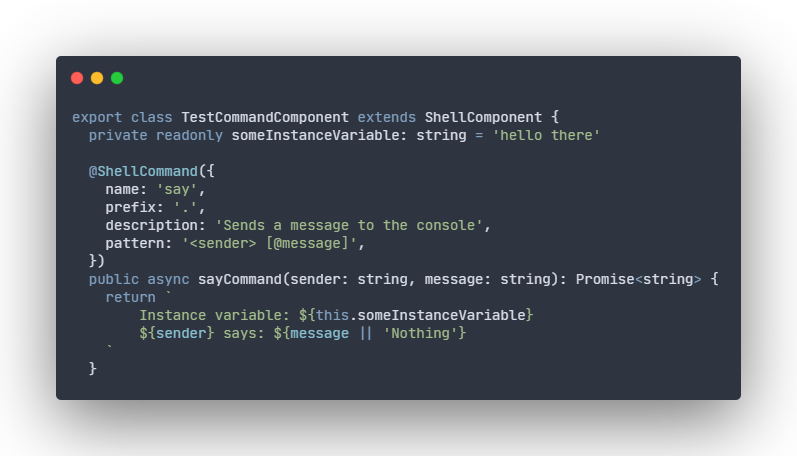
Security News
MCP Steering Committee Launches Official MCP Registry in Preview
The MCP Steering Committee has launched the official MCP Registry in preview, a central hub for discovering and publishing MCP servers.
nestjs-shell
Advanced tools
An interactive shell for NestJS which allows you to plug-in your custom commands and use them when the app's running

I wanted to create as simple as possible API without redundant use cases. Which allows you to create a simple command in less than a minute (counting installation time).
Currently, there are a few libraries that provide something similar to this, but they violate your app's execution file with their code and require you to re-run the app's instance every time you want to execute a command.
So I decided to give you full control of where and when shell's instance should start and a way to execute commands in runtime.
For more examples, go there: https://github.com/bmstefanski/nestjs-shell-example

# production use
$ yarn add nestjs-shell
# development use
$ yarn add -D nestjs-shell
import { ShellModule, ShellFacade } from 'nestjs-shell'
// `ShellModule` is Global, so please put it only in your main module and it will work flawlessly in others.
@Module({ imports: [ShellModule] })
export class YourAppMainModule implements OnApplicationBootstrap {
constructor(private readonly shellFacade: ShellFacade) {}
public async onApplicationBootstrap(): Promise<void> {
// You can use it without passing any arguments and use default configuration or configure it in your own way.
await this.shellFacade.bootstrap()
// It does not have to be here, you can register components anywhere you want and as many times as you need.
this.shellFacade.registerComponents(
new SayCommandComponent(),
new AnotherSecondTestCommandComponent(new SomeDependency()),
)
}
}
import { ShellCommand, ShellComponent } from 'nestjs-shell'
/* Please do not put @Injectable() or any other decorator that creates a new instance of a class,
it may cause bugs and it is definitely not going to work the way you want.
*/
export class SayCommandComponent extends ShellComponent {
/* Only `name` property is required, so by default you have no prefix, no description and no pattern
and it works fine!
*/
/* Pattern ideology is simple:
if your parameter name is wrapped with `<` and `>` then it's required
if your parameter name is wrapped with `[` and `]` then it's optional
if there is `@` sign inside any brackets (`[` or `<`) then it's varargs.
Same as in JavaScript varargs, they can only be placed in the last parameter.
*/
@ShellCommand({
name: 'say',
prefix: '.',
description: 'Sends a message to the console',
pattern: '<sender> [@message]',
})
public async sayCommand(sender: string, message: string): Promise<string> {
return `${sender} says: ${message || 'Nothing'}`
}
// There is no limit to the amount of commands in one ShellComponent.
@ShellCommand({
name: 'said',
prefix: '/',
description: 'Sends a message to the console that has been said',
pattern: '<sender> <@message>',
})
/* You don't have to keep function's parameters in the same order as pattern ones.
They are applied by name, not order.
*/
public async saidCommand(sender: string, message: string): Promise<string> {
return `${sender} said: ${message}`
}
}
import { ShellCommand, ShellComponent } from 'nestjs-shell'
export class AnotherSecondTestCommandComponent extends ShellComponent {
constructor(private readonly someDependency: TestDependency) {
super()
}
/* You can use as much prefixes as you want..
if you do not specify any then it uses the default, which is '' (empty string)
*/
@ShellCommand({
name: '.help',
description: 'Displays all commands with description and usage',
})
public async help(): Promise<string> {
// Method's execution context is ALWAYS set to the actual class instance and so `this` keyword works as expected.
return [
'Here are all available commands: ',
'-------------------------------------',
...this.someDependency,
...this.shellFacade.getAllCommands().map((command) => {
return `-> ${command.name} ${command.pattern} - ${command.description || 'Description not available'}`
}),
'-------------------------------------',
].join('\n')
}
}
The library shares its methods through the facade, named ShellFacade. In the table below, you can see a brief description of each method.
import { ShellFacade } from 'nestjs-shell'
| Method | Description | Arguments |
|---|---|---|
bootstrap | Enables terminal | BootstrapOptions |
registerComponents | Adds command components to the registry | ...components: ShellComponent[] |
getAllCommands | Returns immutable (or to be more precise: deep copy of a) collection) | naught |
type BootstrapOptions = {
prompt?: string = '⤳'
messages?: { notFound?: string; wrongUsage?: string } = {
notFound: 'Say what? I might have heard $input',
wrongUsage: 'Wrong usage: $command $pattern',
}
shellPrinter?: ((value: any) => void) = (value: any) => console.log(value)
}
Note: If you want to contribute, please keep in mind that I don't want to support various use cases, it should remain as simple as it is. So if you desire to improve code rather than add features, then I would greatly appreciate it 🙏🏻🙏🏼🙏🏽🙏🏾🙏🏿.
Nestjs-shell is MIT licensed
FAQs
An interactive shell for NestJS which allows you to plug-in your custom commands and use them when the app's running
The npm package nestjs-shell receives a total of 100 weekly downloads. As such, nestjs-shell popularity was classified as not popular.
We found that nestjs-shell demonstrated a not healthy version release cadence and project activity because the last version was released a year ago. It has 1 open source maintainer collaborating on the project.
Did you know?

Socket for GitHub automatically highlights issues in each pull request and monitors the health of all your open source dependencies. Discover the contents of your packages and block harmful activity before you install or update your dependencies.

Security News
The MCP Steering Committee has launched the official MCP Registry in preview, a central hub for discovering and publishing MCP servers.

Product
Socket’s new Pull Request Stories give security teams clear visibility into dependency risks and outcomes across scanned pull requests.

Research
/Security News
npm author Qix’s account was compromised, with malicious versions of popular packages like chalk-template, color-convert, and strip-ansi published.